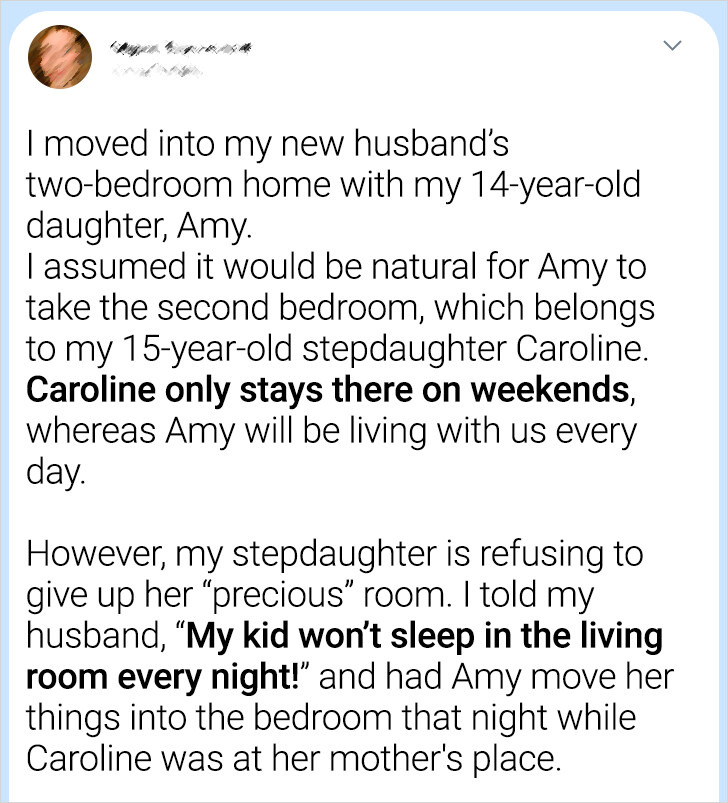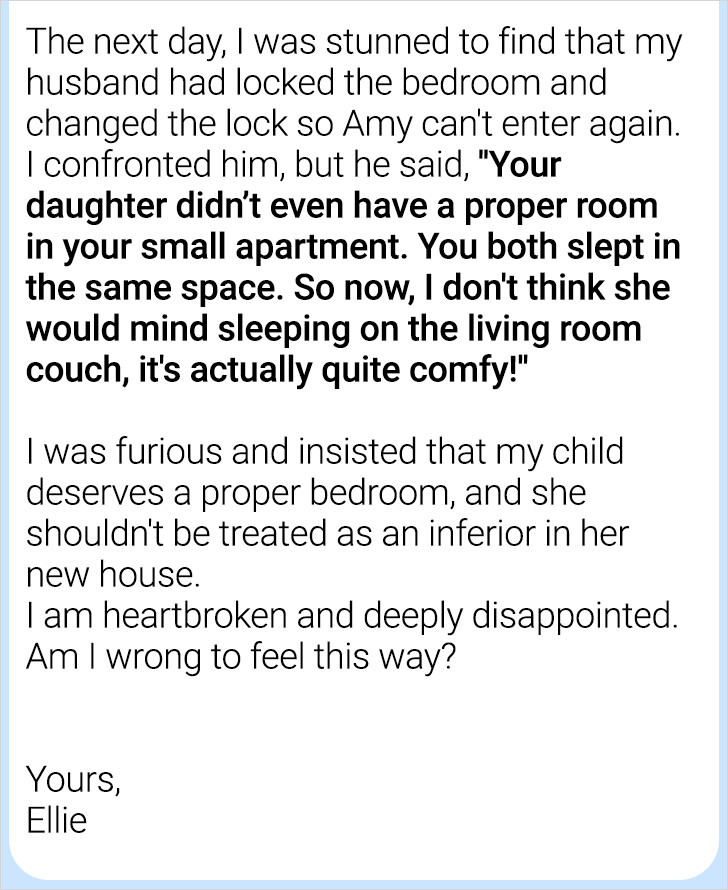That's a red flag. Divorce and new home / life for you and your daughter.
My Daughter Is Treated as Inferior in My Husband’s Home

We all strive to treat our children equally, but in newly blended families, things can get complicated. This challenge hit home for Ellie when she and her teenage daughter Amy recently moved into her new husband's house, only to discover that the girl wouldn't have her own room. Ellie proposed that her husband's daughter give up her room, but things quickly took a turn for the worse.
This is Ellie’s letter:


Dump the husband he's no good
Suggest you find new housing; either for all of you in a place with three bedrooms, or that you two move out if you can afford it. Of course, counseling could also help.
All of this should have been discussed BEFORE you even decided to move. He will never treat your daughter any differently so you might as well realize that this relationship is nothing to build on.
You and your daughter feel better about having your own place. IF you're going to move in together, it's better to get a completely new place where both girls have their own room so there won't be an argument about the whole thing. Of course it costs, but if he is so intractable, this or not moving together are the only options.
His daughter will always come first unfortunately…
Thank you for sharing your story with us, Ellie. Here are some tips that we hope can be useful.
Seek mediation or counseling.
Given the emotional tension and differing perspectives between you and your husband, it might be beneficial to seek professional mediation or counseling. A neutral third party can help facilitate a constructive discussion where both your and your husband's concerns about the living arrangements can be addressed.
This could help find a compromise that considers Amy's needs for a stable living environment and Caroline's attachment to her room.
Legal consultation.
Changing locks and denying access to a living space can be legally contentious, especially when it involves minor children. Consider consulting with a family law attorney to understand your rights and legal options in this situation.
They can provide guidance on how to navigate the legal aspects of property rights and the rights of minors in your specific jurisdiction.
Family meeting with both children present.
Arrange a family meeting where both Amy and Caroline are present. This allows them to express their feelings about the living arrangement directly to each other and to the adults involved. Facilitate an open discussion where each child's perspective is heard and respected.
This can foster empathy and understanding between them, potentially leading to a solution that both can accept.
Explore temporary solutions.
While working through the emotional and logistical challenges, consider temporary solutions that prioritize Amy's comfort and sense of belonging in her new home. This might involve temporary room-sharing arrangements or adjusting schedules to accommodate both girls' needs.
Keeping communication open with your husband and both children during this adjustment period is crucial to finding a more permanent resolution.
Lindsay is also facing issues with her husband over a matter involving her daughter being treated less equally than her stepdaughter. Lindsay wanted to buy an expensive gift for her daughter's graduation, similar to what her stepdaughter received a year earlier. However, her husband refused and said something that crushed Lindsay's soul. Here is her story.
Comments
I'd be mad if I was the step daughter. It IS HER ROOM. I would talk to my new husband and come up with a plan to update a room in the basement or attic or storage room of some kind. Offer it to OP's daughter . It is very important to make OPs daughter feel welcome and important. Probably the step daughter will want it.
Related Reads
I Canceled My Husband’s Birthday Party After Hearing What He Secretly Told My Daughter

I’m Divorcing My Wife Because of What She Did to My Baby

My Sister Refused to Invite My Son to Her Wedding Because of His Appearance

14 Fascinating Stories That Could Only Happen at the Airport

I Kicked My Friends Out of My Home After Their Daughter’s Tantrum

My Selfish Daughter Doesn’t Want to Have Kids and Preserve Our Family, So I Was Forced to Have Babies for Her

I Followed a TikTok Account for Housewives and Accidentally Found Out My Husband Was Cheating

12 True Stories That Pressed All Our Anger Buttons

12 Disturbing Memories That Tore People Apart

15 Moments That Show Kindness Is Quiet but Changes Everything

15 Success Moments From Strangers That Deserve All the Golden Buzzers in the World

I Refuse to Help My Pregnant Sister, and I Don’t Feel Guilty





